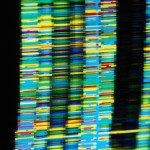Link to Pubmed [PMID] – 20308322
Mol. Cell. Biol. 2010 Jun;30(11):2762-74
Alternative splicing and posttranslational modifications (PTMs) are major sources of protein diversity in eukaryotic proteomes. The SR protein SF2/ASF is an oncoprotein that functions in pre-mRNA splicing, with additional roles in other posttranscriptional and translational events. Functional studies of SR protein PTMs have focused exclusively on the reversible phosphorylation of Ser residues in the C-terminal RS domain. We confirmed that human SF2/ASF is methylated at residues R93, R97, and R109, which were identified in a global proteomic analysis of Arg methylation, and further investigated whether these methylated residues regulate the properties of SF2/ASF. We show that the three arginines additively control the subcellular localization of SF2/ASF and that both the positive charge and the methylation state are important. Mutations that block methylation and remove the positive charge result in the cytoplasmic accumulation of SF2/ASF. The consequent decrease in nuclear SF2/ASF levels prevents it from modulating the alternative splicing of target genes, results in higher translation stimulation, and abrogates the enhancement of nonsense-mediated mRNA decay. This study addresses the mechanisms by which Arg methylation and the associated positive charge regulate the activities of SF2/ASF and emphasizes the significance of localization control for an oncoprotein with multiple functions in different cellular compartments.

